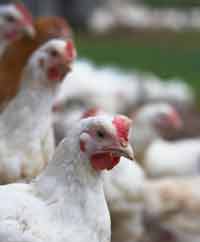Tighter biosecurity needed to tackle campylobacter

Tighter biosecurity on poultry farms and improved hygiene standards in processing plants are essential to win the battle against campylobacter – the bacterium responsible for the greatest number of food poisoning cases each year.
Those were among the key messages to emerge from a recent meeting of almost 100 international experts in London, organised by the Food Standards Agency.
Last year there were an estimated 300,000 cases of food poisoning linked to campylobacter in England and Wales, out of a total of about 1m instances of food-borne disease in humans. Around 15,000 of these led to hospitalisation and there were some 80 deaths.
Poultry meat was the primary source of infection, FSA expert Gael O’Neil told Farmers Weekly, though it is also found in other species such as cattle and sheep. “An estimated 75% of broiler flocks in the UK are contaminated, so getting on top of it at farm level is a key intervention for any strategy,” she said.
Experience from Scandinavia, where infection rates are less than 10%, showed that heightened biosecurity at farm level, such as having isolated changing facilities and minimising the number of times people mixed with the birds, was the key factor.
Infection rates were also lower in Iceland, where netting is used to keep flies and midges out of all broiler units in the summer months.
“We know that campylobacter is not found in chicks. It only appears after about 21 to 28 days, which suggests it must come in from outside,” said Ms O’Neil.
The conference also heard how strict hygiene controls in slaughterhouses, especially in the evisceration area, could make a huge difference to the percentage of chicken meat subsequently found to contain campylobacter.
New Zealand and the USA had scored major successes in reducing contamination rates, though this was mainly linked to the use of anti-microbial washes such as chlorine, which are not allowed in the EU.
• For a full report on campylobacter, see the May issue of Poultry World, available in selected newsagents from 30 April, or call 0845 0777744 for a subscription.
